When we published Nicanor’s Open Letter to President Rodrigo Duterte last April, our website received more than 100,000 page views from over 74,000 users over a few days. To get as many people are possible to pay attention to the letter, we used a variety of methods of distribution. Our stats showed that a large majority of those who visited our site were direct visits. This was expected as we utilized text messaging and email to reach other people. Direct marketing was done on April 19, 2020.
To determine whether it was worthwhile to do social media marketing, we only shared on Facebook the link to the open letter on April 20, 2020, one day after the letter was actually posted on our site. This way, hoped to measure how much effect social media had on our reach. On April 19 (when we updated our personal contacts through text and email), the website received around 3,600 page views from around 2,400 users. The next day, the website received a staggering 50,006 views from 33,686 users. Clearly, Facebook marketing made a huge impact.
If you look at the chart below, you will notice the gradual decline in the number of visits to the site. We expected the fall in page views as more and more people have already visited the site, and many of them were not bound to re-read the article. We received 2,974 views on April 24, 2020 from 2,318 users, the lowest for that week.
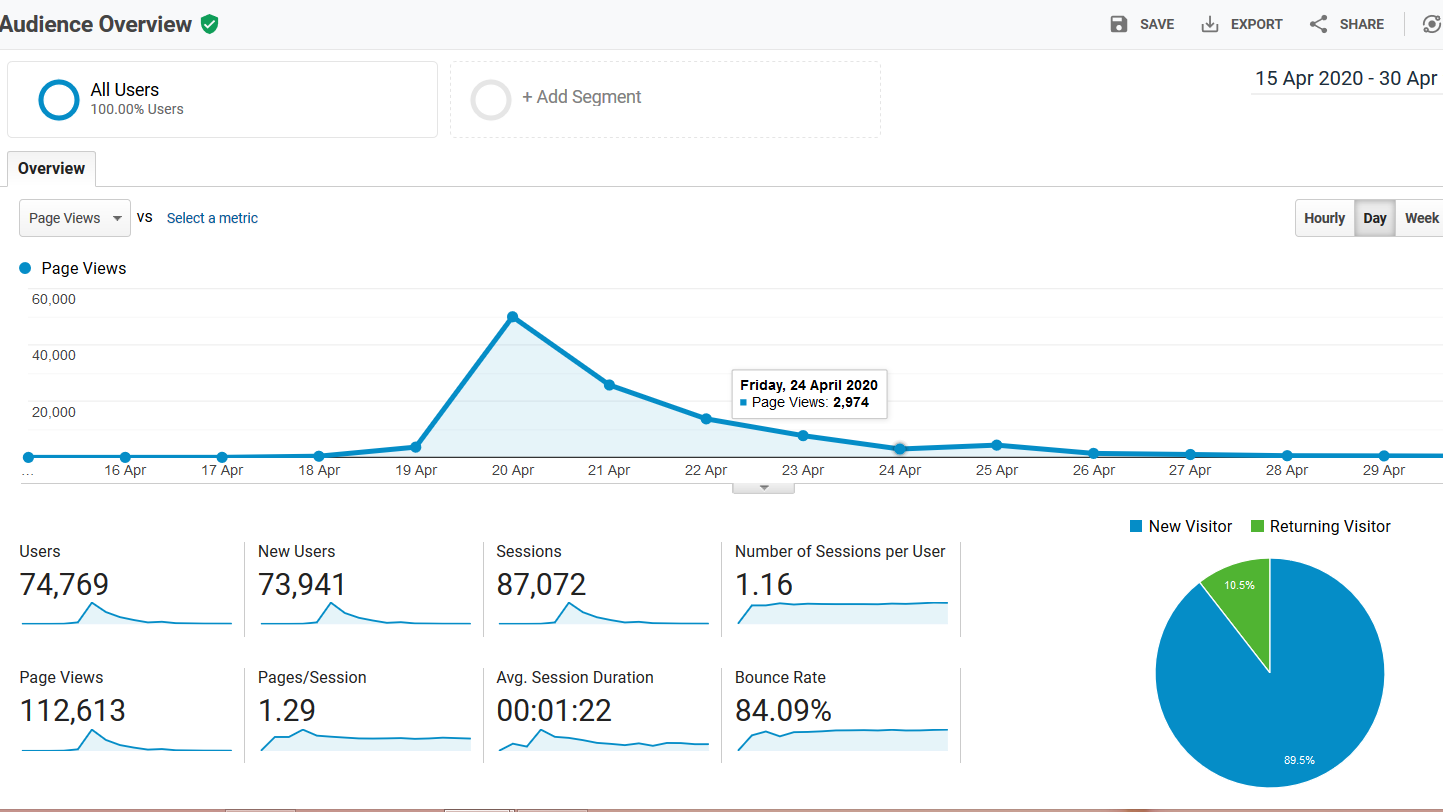
We decided to re-share the same article on April 25, 2020, and we received another 4,400 views from 3,343 users on that day. We however noticed that instead of a gradual fall in page views, the next day, there were only roughly 1,400 views to the site from 1,118 users. We knew that some friends were still re-sharing the articles to various groups and we were not expecting this result, but decided that perhaps whoever wanted to read that article may have already done so.
Then on May 25, 2020, Nicanor wrote another article entitled The Pandemic of Censorship which tackled internet censorship during the time of COVID-19. Needless to say, we utilized the same marketing strategy we employed in the open letter. Through direct marketing done on May 26, 2020 we received around 3,000 views from 2,303 users, a number that is comparatively close to the visits we had last April 19. What was surprising was the data for the next day.
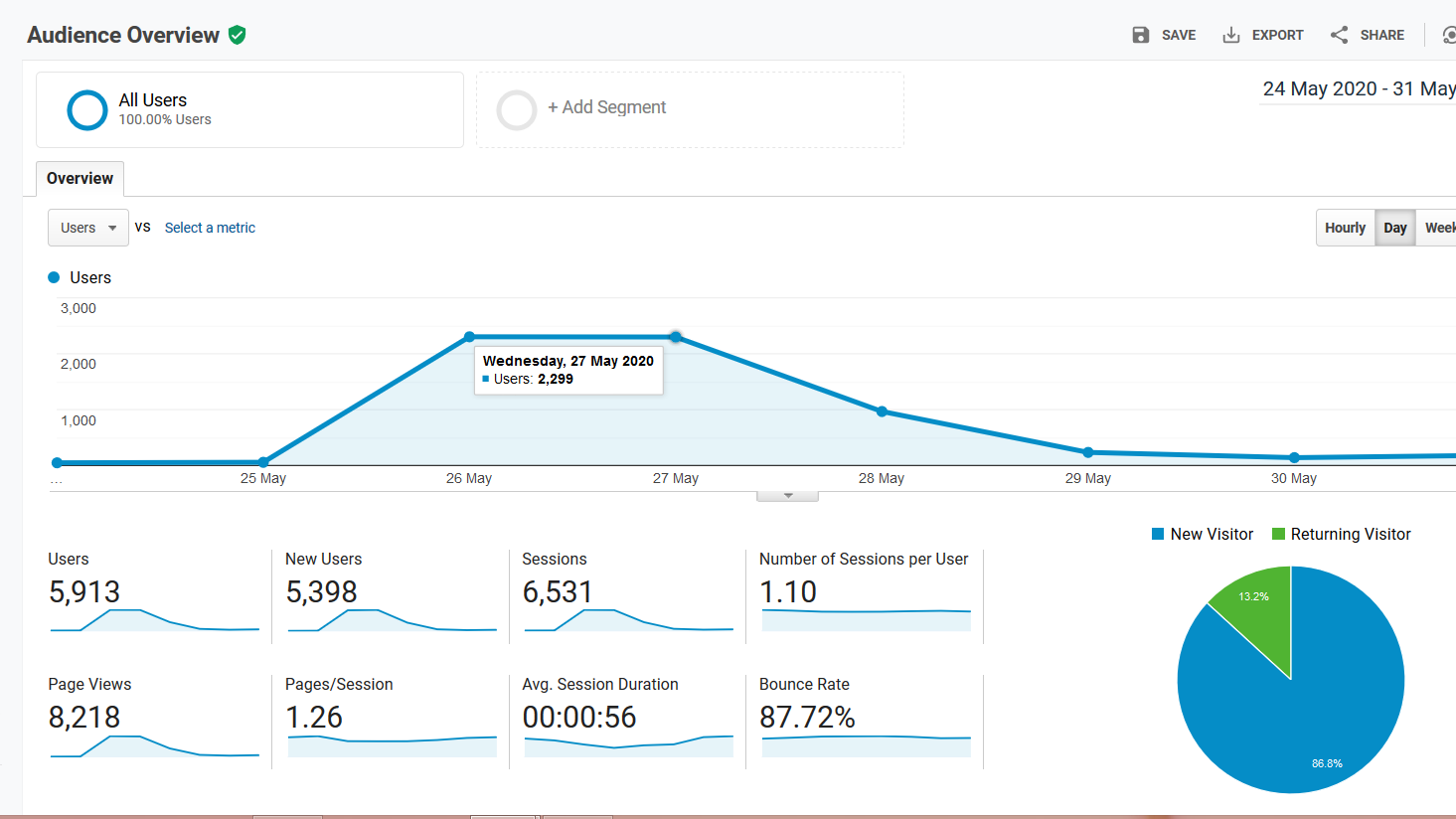
Instead of the expected surge in views from our Facebook posting, we only received 2,939 visits from 2,299 visitors. We shared the article to the same groups and pages we shared the Open Letter to. The difference this time was that we didn’t tag friends to the post, which meant that they weren’t immediately alerted to the existence of the article. As we know, Facebook utilizes algorithm to prioritize posts on news feeds, and apparently, our post was deprioritized in the new feeds of our friends. This happened even when they were following our own page. But we had no real proof to show the world that this was happening. Also, we were just one small website – surely, Facebook wouldn’t bother censoring our content, would they? We opted to re-share the article on our personal profiles on May 28, 2020 and made sure to tag some friends but opted not to reshare on groups thinking that the article will find its way in the news feeds of those who are interested in the topic.
Then on June 8, 2020 we published the Statement on the Education Situation of Children and Adolescents written by several Filipino doctors and other medical professionals.
Unaware of our experience the previous month, one of our friends decided that the Statement was very important and needed to be seen by as many Filipinos as possible. She decided to create an ad pointing to the article on our website. A few minutes after submission, she received a message from Facebook saying that her ad was rejected. The reason they gave was that it didn’t comply with the platform’s advertising policies, but Facebook enjoined her to change the ad to conform with the rules and to get it re-approved afterwards.
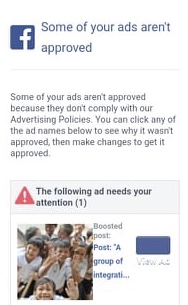
She then made changes to the ad (though, take note, there was no exact description of why her ad was rejected in the first place, and which ad policy she may have violated), and resubmitted it. Lo and behold, instead of the ad for the Statement getting rejected again, her entire ad account was disabled for no reason!
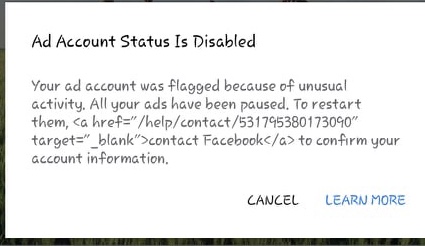
Facebook’s reason: her account was disabled for “circumventing systems policy”. Up to today, we can’t figure out her violation, except that she tried to boost a post that challenged the current narrative about COVID-19. 1Facebook is not alone in this protectionist stance. In May, YouTube CEO explicitly stated that all videos that challenged WHO propaganda will be banned from the platform. See https://www.businessinsider.com/youtube-will-ban-anything-against-who-guidance-2020-4 for details.
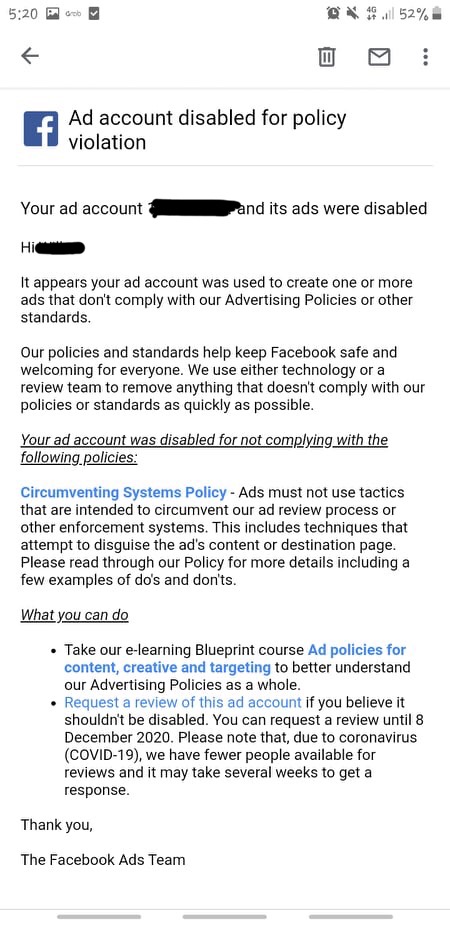
At around the same time this was happening, friends from other countries also messaged to tell us that they can’t access the website if they click the link from Facebook. Apparently, the site has been marked as “unsafe”, a complaint we heard previously when the Open Letter was distributed. To protect our readers, we have opted to install an SSL even though our website does not need it [since we don’t collect personal information on the website].
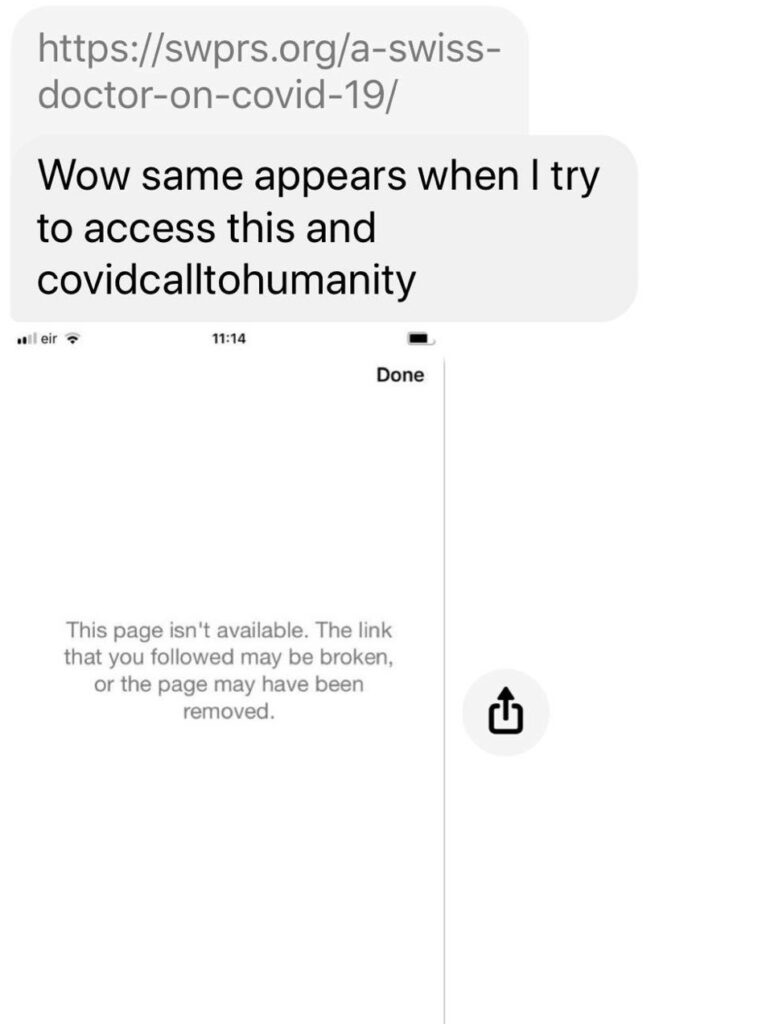
Our decision: To leave Facebook
Despite the huge reach we have experienced with Facebook in April, the experiences of May and June has led us to the decision to leave the platform. We realized that Facebook has made a position, and its position does not involve empowering its users into making a decision for themselves. Whatever benefits Facebook may have in de-prioritizing content and preventing some ads from running, we believe it is contrary to our website’s purpose.
Yes, we might lose a huge chunk of our current audience, but what difference will staying in Facebook make when we now know that people cannot access our website through that channel? Add to this the reality that Facebook is collecting information (they have enough data to create a computerized version of billions of its users), and the platform was designed to hook and distract you.2See https://www.bbc.com/news/technology-44640959, https://www.rd.com/article/why-is-facebook-so-addictive/ It is such a black hole that people who swear they will only visit for a few minutes end up scrolling for hours.
To drive home that last point, consider this:
Of the 2.6 billion Facebook users today, 45.4 million are Filipinos. For scale, that’s 2% of FB’s total number of users, but 58% of the Philippines’ adult population.3https://www.manilatimes.net/2019/03/09/news/top-stories/filipinos-hooked-on-facebook-report/522918/ A typical Facebook user from the Philippines spends 10 hours and 2 minutes on the platform per day. Though some use Facebook productively (perhaps to sell products, or to collaborate with project partners), the addictive nature of FB indicates that a huge chunk of time is wasted on the platform.
The longer one stays in Facebook, the easier one’s behavior is tracked and profiled. That in turn makes one susceptible to manipulation – one can be prompted to buy stuff impulsively, to react to issues that run prominently on news feeds, or have their knowledge of history revised and distorted.4 Social media is not a harmless platform – it has been weaponized and used as a vehicle for government propaganda, see https://www.nbcnews.com/tech/tech-news/more-governments-ever-are-using-social-media-push-propaganda-report-n1076301. In 2017, an Oxford study found that our own president spent hundreds of thousands to manipulate sentiments on social media, see https://www.philstar.com/headlines/2017/07/24/1721044/duterte-camp-spent-200000-troll-army-oxford-study-finds.
Our chosen platform: MeWe
Choosing to break free from Facebook is our own brand of protest.
Leaving Facebook may seem like a gargantuan task, but studies are showing that millions have already left the platform. In the US alone, 15 million users have left in the past 2 years.5https://www.cnet.com/news/facebook-lost-15-million-us-users-in-the-past-two-years-report-says/ A number of them have sworn that they could find everything they need elsewhere.6https://www.msn.com/en-in/money/news/facebook-was-designed-to-be-addictive-but-users-who-broke-up-with-the-platform-say-they-can-find-everything-they-need-elsewhere-especially-during-a-pandemic/ar-BB139Xwa
So leaving Facebook may not be so difficult after all. Moreover, various alternatives which are distraction-free and privacy-friendly are available to us. 7Read END THE LOCKDOWNS! Stop It Outside By Ending the Lockdowns Inside Us to find credible alternative news sources and trustworthy social media platforms.
If you too, want to set yourself free from the toxicity and programming of Facebook, come and follow us at MeWe.
Sources
Resources
- 1Facebook is not alone in this protectionist stance. In May, YouTube CEO explicitly stated that all videos that challenged WHO propaganda will be banned from the platform. See https://www.businessinsider.com/youtube-will-ban-anything-against-who-guidance-2020-4 for details.
- 2
- 3https://www.manilatimes.net/2019/03/09/news/top-stories/filipinos-hooked-on-facebook-report/522918/
- 4Social media is not a harmless platform – it has been weaponized and used as a vehicle for government propaganda, see https://www.nbcnews.com/tech/tech-news/more-governments-ever-are-using-social-media-push-propaganda-report-n1076301. In 2017, an Oxford study found that our own president spent hundreds of thousands to manipulate sentiments on social media, see https://www.philstar.com/headlines/2017/07/24/1721044/duterte-camp-spent-200000-troll-army-oxford-study-finds.
- 5https://www.cnet.com/news/facebook-lost-15-million-us-users-in-the-past-two-years-report-says/
- 6https://www.msn.com/en-in/money/news/facebook-was-designed-to-be-addictive-but-users-who-broke-up-with-the-platform-say-they-can-find-everything-they-need-elsewhere-especially-during-a-pandemic/ar-BB139Xwa
- 7Read END THE LOCKDOWNS! Stop It Outside By Ending the Lockdowns Inside Us to find credible alternative news sources and trustworthy social media platforms

This is true many people and I experienced it too. FB is surveiling my communications… someone is really hiding truths around…
This happened to us, at least twice, already. Facebook suspended our account simply because we sharply criticized Donald Trump, rightwing Republicans, and their ilk.